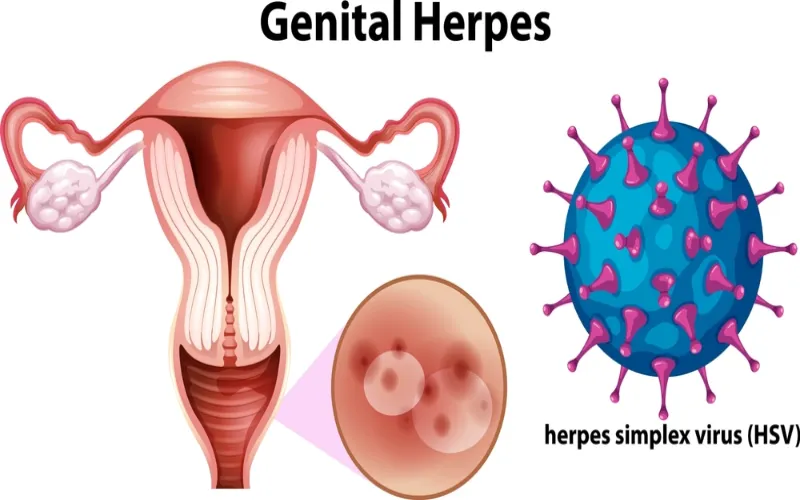Genital herpes infection, commonly referred to simply as herpes, is a sexually transmitted infection (STI) that remains a significant concern for many. It’s vital to have accurate information about this disease for prevention, treatment, and management.
Causes of Genital Herpes
Exploring the root causes of genital herpes, including the different types of herpes simplex virus and how they spread.
Types of Herpes Simplex Virus (HSV)
Herpes is primarily caused by two types of the herpes simplex virus: HSV-1 and HSV-2.
- While HSV-1 typically causes cold sores around the mouth, it can be transmitted to the genitals through oral sex.
- HSV-2 is the more common culprit for genital herpes.
Transmission Methods
The herpes virus spreads through direct skin-to-skin contact, especially during sexual activity. This includes vaginal, anal, and oral sex. The virus can be transmitted even if the infected person shows no symptoms, making it highly contagious.
Symptoms of Genital Herpes
A comprehensive look at the varied symptoms of genital herpes, ranging from mild discomfort to severe outbreaks.
Initial Outbreak Signs
The first episode after contracting the herpes virus can be intense. Symptoms might include fever, muscle aches, and swollen lymph nodes. People might also experience pain, itching, and tingling in the genital area, followed by sores or blisters.
Recurrent Outbreaks
Over time, outbreaks tend to become less severe. However, they can still present with blisters, ulcers, and lesions in the genital area. Some individuals may feel a tingling sensation before the appearance of sores, acting as a warning sign.
Learn more about Yeast Infection vs. Chlamydia: Key Differences.
Treatment Options for Genital Herpes
While there’s no cure for herpes, there are several medications and practices that can help manage outbreaks and reduce transmission risks.
Antiviral Medications
Doctors typically prescribe antiviral medicines like acyclovir, famciclovir, or valacyclovir. These medicines can help reduce the severity and frequency of symptoms and decrease the risk of spreading the infection to partners.

Preventive Measures
Using condoms consistently can significantly reduce the risk of transmitting herpes. Open communication with partners about STIs, getting regular STI checks, and avoiding sexual contact during an active outbreak are other crucial preventive steps.
Genital Herpes and Pregnancy
It’s essential to understand the risks and precautions concerning genital herpes during pregnancy, as it can impact both the mother and baby.
Risks to the Baby
If a woman has her first herpes outbreak during pregnancy, there’s a risk of transmitting the herpes virus to the baby during delivery. This can lead to neonatal herpes, a serious condition.
Precautions and Advice
Doctors might recommend a cesarean delivery to reduce the risk of transmission. Regular medical check-ups, taking antiviral medication, and avoiding sexual contact with infected partners are crucial during pregnancy.
Complications of Genital Herpes
Beyond the immediate symptoms, genital herpes can lead to several complications, affecting various areas of one’s health and well-being.
Increased Risk of Other STIs
People with genital herpes are more likely to contract other sexually transmitted infections, especially HIV. The sores and breaks in the skin make it easier for HIV to enter the body.
Herpetic Whitlow
This is an infection of the fingers caused by the herpes virus, which can occur if an individual touches infected genital areas and then touches their hands.
Meningitis and Other Neurological Complications
Rarely, the herpes simplex virus causes membranes and cerebrospinal fluid inflammation surrounding the brain and spinal cord.
Coping and Support
Dealing with a genital herpes diagnosis can be emotionally challenging. It’s vital to seek both medical and emotional support.
Regular Medical Check-ups
Regular appointments with a healthcare provider ensure the disease is managed effectively. It also helps to catch potential complications early.
Joining Support Groups
There are many support groups available both online and offline. Joining these communities can help affected individuals share their experiences, coping strategies, and gain advice.
Open Communication with Partners
Transparency about the infection is vital. Before engaging in sexual activity, discuss the risks with partners and ensure that both parties are informed and consensual.
Key Takeaways
Understanding genital herpes is the first step to managing it effectively.
- Genital herpes, primarily caused by the herpes simplex virus, is a contagious sexually transmitted infection.
- Symptoms vary from mild tingling to severe outbreaks of blisters and sores.
- While there’s no cure for herpes, antiviral medications can manage symptoms and reduce transmission risks.
- Preventive measures, like consistent condom use and open communication, are crucial.
- Regular medical check-ups, seeking emotional support, and staying informed are essential for those with genital herpes.
FAQs
Does having herpes increase cancer risk?
There’s no direct link between herpes and cancer, but a weakened immune system can increase susceptibility to various illnesses.
Can a herpes outbreak be a single sore?
Yes, while outbreaks often involve multiple sores, it’s possible to have an epidemic with just one sore.
How is the herpes virus tested?
Blood tests, tissue swabs, and physical examinations are typically used to diagnose herpes.




